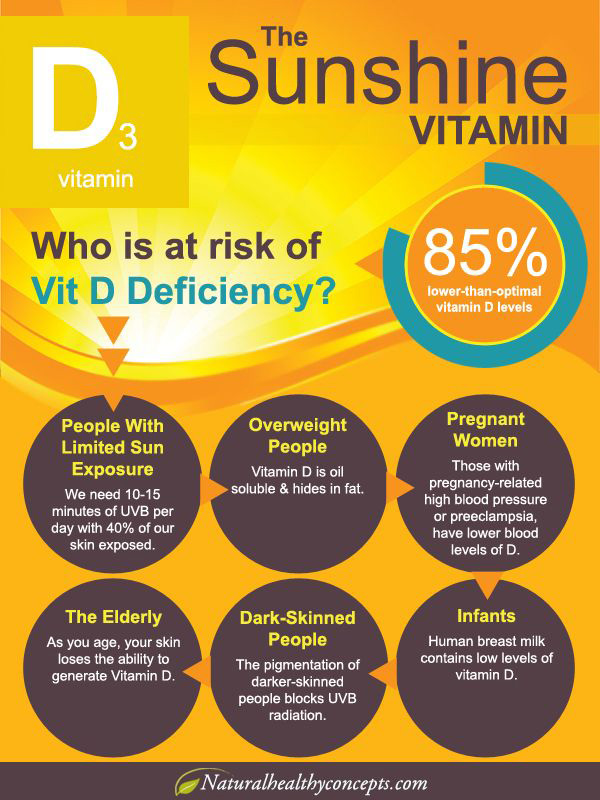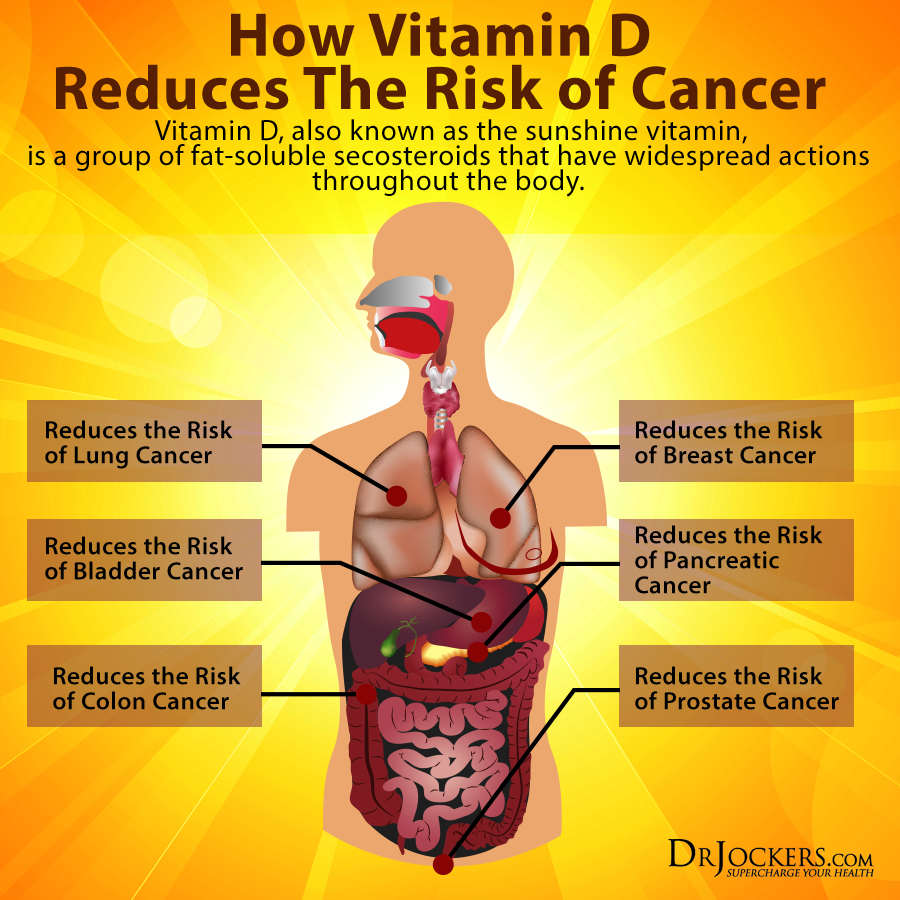You have likely heard about Vitamin D. It is often mentioned in reference to the sun. You may have some awareness that Vitamin D, like all vitamins, is crucial to your health. However, you may not know exactly what Vitamin D does, how it helps your body, how the sun is involved, and other ways to supply your body with Vitamin D. Read on to learn all about Vitamin D.
:: What exactly is Vitamin D? ::
Vitamin D is an interesting nutrient. It is a fat-soluble vitamin that functions as a steroid hormone. Vitamin D receptors are found in tissues throughout the human body. Vitamin D is only a vitamin when we do not get enough sun exposure, since we can make vitamin D in our skin with sun exposure. Ultraviolet B (UVB) rays interact with cholesterol in our bodies to form the components of Vitamin D.
:: How is Vitamin D made in the body? ::
The production of Vitamin D is a complex process in the body. It starts in the skin, where ultraviolet light causes conversion of the molecule 7-dehydrocholesterol (a component of what we call Cholesterol) into pre-vitamin D2. This is then converted to cholecalciferol (also called Vitamin D3). This skin synthesis of Vitamin D3 accounts for 80% of the Vitamin D in our bodies.
Next, in the liver, Vitamin D precursors are converted to 25-hydroxyvitamin D, which is also known as 25(OH)D for short. This is the main circulating form of Vitamin D, so doctors usually test for this form of Vitamin D and use the results to determine a patient’s vitamin D status.
Finally, in the kidneys, Vitamin D is converted into calcitriol. This is the active metabolite of Vitamin D, which is what your body uses for its functions. It only circulates in the body for a few hours, which is why we do not typically consider calcitriol when measuring Vitamin D levels.
:: What is the role of Vitamin D in the body? ::
Vitamin D plays a role in regulating over 200 of the body’s genes. Vitamin D influences many body functions including cell proliferation, cell differentiation, apoptosis, oxidative stress, membrane transport, matrix homeostasis, tissue mineralization, and cell adhesion.
Functionally, Vitamin D deficiency can have a big effect on physical and mental health. For example, a Vitamin D deficiency can alter immune system functioning. Vitamin D deficiency is also associated with several mental health conditions, including depression.
:: What causes Vitamin D deficiency? ::
Certain populations are at greater risk of developing Vitamin D deficiency. Research shows that the prevalence rate of Vitamin D deficiency in the general population is very high at about 41.6%. It is more common among people with no college education, general poor health status, and/or obesity.
People with darker skin, including Hispanics and African-Americans are also at greater risk, because the darker the skin tone the more sun exposure is needed to make the same amount of vitamin D in the skin. The same effects can occur in very tan individuals. Whites and Asians also have more Vitamin D receptors.
Certain diets can lead to Vitamin D deficiency. Some Vitamin D can be obtained through fish, milk and dairy products, so if you have cut those from your diet then you may contribute to the deficiency. Other restrictive diets such as a Vegan diet can also contribute to Vitamin D deficiency, so it may be particularly important to consider vitamin D supplements if are on a restrictive diet.
:: How do I prevent or correct Vitamin D deficiency? ::
Supplements: You can also increase your Vitamin D intake with supplemental vitamin D drops or pills.
Diet: One strategy to get Vitamin D is through diet. Consuming salmon, mackerel, tuna, sardines, eggs, beef liver, cod liver oil, and certain types of mushrooms will provide natural Vitamin D. You can also purchase foods fortified with Vitamin D, which means it is intentionally added to a product. This includes milk and dairy products.
Sun: The sun plays an important role in the natural body manufacturing of Vitamin D. The ancient strategy to increase Vitamin D is by outdoor, sun-exposure. When indoors, the necessary ultraviolet rays cannot reach us through windows. Some people also elect to use tanning beds to help restore their Vitamin D and correct deficiencies. Dermatologists discourage excessive sun exposure because it increases risk for skin cancer. So you may need to discuss this with your doctor and consider your family history and risk for skin cancer. Vitamin D deficiency is very common in Brooklyn, NY and when I test my patients, unless they take supplements they often are deficient in vitamin d. New York City pollution or northern latitude just make it more difficult to make sufficient quantities of vitamin D from sun exposure. If you live in Brooklyn or New York City year round, you should consider taking vitamin D supplements.
:: Normal Levels of Vitamin D in Healthy Individuals ::
Normal levels of Vitamin D are 30 ng/mL or aboe. Levels between 21 and 29 ng/mL are considered insufficient, and levels below 20 ng/mL are indicative of deficiency. There is such a thing as too much Vitamin D, and that is considered anything above 150 ng/mL. This is called Vitamin D intoxication, and it is quite rare. It can occur in adults if they are taking more than 10,000 IU per day for more than 3 months.
Medical experts recommend minimum Vitamin D levels of 20 ng/mL or more. Based on this, the official Recommended Daily Allowance (RDA) of Vitamin D is 600 IU/day for individuals up to 70 years old, and 800 IU/day for older patients. These recommendations are meant for the general population, and are believed to cover the requirements of more than 97.5% of the population.
Yet these RDA recommendations may actually be too low, as many people who take 600 to 800 IU/day remain insufficient or deficient in Vitamin D. People without adequate sun exposure, both children and adults, may require closer to of 800-1000 IU of Vitamin D per day to maintain sufficiency. For example, because of Brooklyn’s and New York City’s location at a relatively high latitude, at least 1600-2000 IU of Vitamin D3 per day may be appropriate, which is the dose found by research studies to maintain the sufficient level.
In the holistic health community, many practitioners recommend very high dose supplementation with up to 10,000 IU per day. Yet after reviewing the research evidence, I do not think such high levels of supplementation are a good idea until we know more about Vitamin D. This is because, overall, the research on Vitamin D levels is still new and growing. Additionally, some research suggests there may be harm from too much Vitamin D, for example by increasing risk for certain types of cancer.
Many functional medicine doctors and functional psychiatrists recommend supplementing at doses of 2000-4000 IU/day especially for individuals who are starting with very low levels to bring the levels up to normal. At this time, I believe this moderate approach in supplementing, along with regular testing to monitor the levels, may be the best approach. This will protect from deficiency without over-dosing.
As we have learned, Vitamin D is important for your body’s healthy functioning. If you are struggling with health problems or mental health concerns, you may want to consult with a specialist to assess your Vitamin D levels. If there is a deficiency, a specialist can work with you to make diet changes and incorporate any necessary supplements to restore balance. An integrative specialist can help by holistically examining and treating mind-body health.





